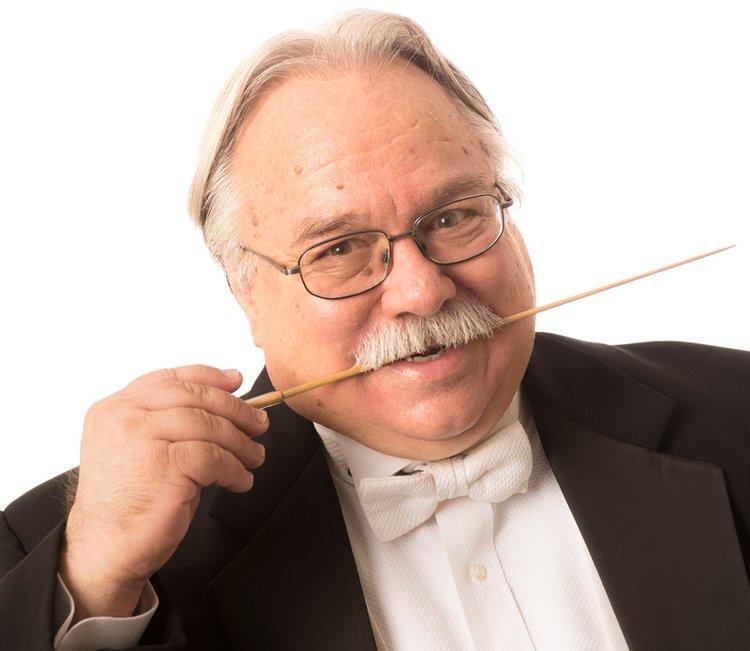
Section Branding
Header Content
George Del Gobbo on the joys of conducting the Columbus Symphony
Primary Content
LISTEN: You can hear the Columbus Symphony in concert on GPB Radio in February on Front Row Georgia. GPB's Sarah Zaslaw recently caught up with its maestro.

If not for a captivating grade school lesson about the physics of vibrating strings, Columbus Symphony Orchestra music director George Del Gobbo might have missed his calling. But thanks to that science teacher, Del Gobbo found his way to violin and then to conducting, and ultimately from the Northeast to Georgia where, since 1987, he has led the second-oldest orchestra in America.
You can hear the Columbus Symphony in concert on GPB all this month on Front Row Georgia.
GPB's Sarah Zaslaw recently caught up with its maestro. Here's what he said:
On the Columbus Symphony’s historic founding
"Supposedly it was founded in 1855 by a man named Herrman Saroni, who was apparently a student of Felix Mendelssohn. He found his way to Columbus, Ga., according to newspaper reports, because he thought it was a city that had a good cultural climate. He stayed here a few years and started the orchestra, and then he moved to Ohio. Obviously not a full-time professional orchestra, but we were here in 1855. [The oldest professional orchestra in the land, the New York Philharmonic, was founded in 1842.]"
On discovering conducting
"My high school orchestra teacher [in Erie, Pa.] was very pleased to let his students conduct the orchestra. And that opportunity, coupled with the fact that I really like to be in charge of everything I’m associated with, led me down the path to a conductor. I went to Eastman as a violinist because they didn’t really have a conducting major at the time, but they had one immediately after I arrived there, and so I switched over after a year or two."
On settling down in Columbus
"I was thrilled to have the job, and I loved the orchestra and the spirit of collegiality. I didn’t really have many long range plans, and I didn’t have a burning desire to leave. The orchestra got better and better, and the community kind of grew on me. It’s a great place to have a family and raise a family, and it’s close enough to Atlanta that I can partake of Atlanta when I want to. And the years went by; what can I say?"
On Columbus State University’s Schwob School of Music as a source of musicians
"We have a very, very strong violin class at the school and we are very happy to employ those students. A lot of them go from here to the Curtis School of Music and places like that; they’re very gifted people. And the rest of the strings program has developed over the years. We’re very fortunate. And we have some faculty, of course, in the orchestra."
On the decor of the orchestra’s venue
"The man who was the executive director [of the RiverCenter for Performing Arts] during construction was a Florida State graduate, so everything is garnet and gold."
On the Columbus Symphony’s open dress rehearsals
"We have a lot of elderly people who don’t feel safe or comfortable going out at night, and so they can come to those rehearsals. They’re free of charge. We have a lot of people with very small children who likewise don’t feel comfortable having a 2-year-old or a 3-year-old at a concert so they can come and we let them run around. If they want to yell, that doesn’t bother us. They can behave however they want."
On its educational outreach
"We have a program called Making Music Matters, which involves giving small group lessons to elementary school-aged students — mostly in violin, but we have also done percussion and trumpet. These are afterschool programs that meet usually twice a week. Our hope is that as time goes on, we will expand this program. We also have a thing called The Orchestra Up Close, where we send musicians into the schools in various combinations to talk to kids and demonstrate their instruments and play."
On recovering from the pandemic shutdown
"We’ve kind of been building back our program over the last couple of years. We’ve embarked on a three-year plan to get to where we were before the pandemic started, both financially and in terms of activities, and this is the second year of that process."
On the danger of erring on the podium — or not
"You try obviously as a conductor not to make mistakes, because mistakes can have serious consequences. However, a lot of orchestras are pretty good at ignoring conductors. So if a conductor makes a mistake, they don’t necessarily reflect that in their playing."
On what keeps him going
"When you play music, you take part in that creative process that the composer starts. It gives you a great feeling of satisfaction to be a part of that and to express the music and to include yourself a little bit in that expression. I don’t know of anything that I could do that would give me the same satisfaction. As long as I can hear and move around and they’ll let me, I’ll do this. It’s just that joy that you get from making music."
Transcript edited for brevity.

